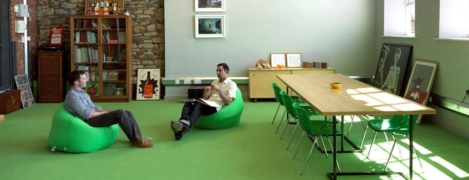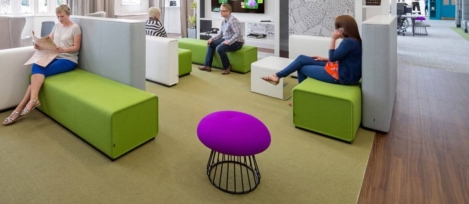June 23, 2015
A gallery of the workplace winners of this year’s RIBA Awards
 The full list of regional winners of the Royal Institute of British Architects (RIBA) Awards for 2015 has been finalised. The list of 37 winners will now go on to compete for the Stirling Prize in October. This year’s list is dominated by London projects, as is often the case, but also by homes whereas last year they were dominated by large scale projects, especially The Shard. We’ve rounded up a gallery of the major workplace projects in the list for England and Wales with some notes extracted from RIBA’s own commentaries (so don’t blame us). Each entry is hyperlinked for you to discover more about the project. Unfortunately, the regional winners for Scotland and Northern Ireland are not well served by their respective websites, which is a particular shame given the success Scotland in particular has in terms of the number and apparent quality of its winning projects.
The full list of regional winners of the Royal Institute of British Architects (RIBA) Awards for 2015 has been finalised. The list of 37 winners will now go on to compete for the Stirling Prize in October. This year’s list is dominated by London projects, as is often the case, but also by homes whereas last year they were dominated by large scale projects, especially The Shard. We’ve rounded up a gallery of the major workplace projects in the list for England and Wales with some notes extracted from RIBA’s own commentaries (so don’t blame us). Each entry is hyperlinked for you to discover more about the project. Unfortunately, the regional winners for Scotland and Northern Ireland are not well served by their respective websites, which is a particular shame given the success Scotland in particular has in terms of the number and apparent quality of its winning projects.















 Plans for what is billed as the tallest office building outside of London have been submitted to Birmingham City Council for approval. The proposed 26 storey tower at 103 Colmore Row is planned to stand 346ft (105m) and house some 2,000 office workers. Birmingham is bound to find the scheme attractive as it vies with Manchester for the crown of England’s second city. Up to now, tall buildings have not enjoyed the same appeal in regional cities as much as they have in London. The new building is planned to replace the former NatWest tower which has lain empty on the development site since 2003 and is set to be demolished once plans are finalised for its replacement. If given a green light, the new scheme will incorporate a rooftop restaurant, green roof, terraces, street level shops and cafes and a winter garden.
Plans for what is billed as the tallest office building outside of London have been submitted to Birmingham City Council for approval. The proposed 26 storey tower at 103 Colmore Row is planned to stand 346ft (105m) and house some 2,000 office workers. Birmingham is bound to find the scheme attractive as it vies with Manchester for the crown of England’s second city. Up to now, tall buildings have not enjoyed the same appeal in regional cities as much as they have in London. The new building is planned to replace the former NatWest tower which has lain empty on the development site since 2003 and is set to be demolished once plans are finalised for its replacement. If given a green light, the new scheme will incorporate a rooftop restaurant, green roof, terraces, street level shops and cafes and a winter garden.






 The complete Work&Place archive is now available for you online, with each issue in two formats. PDF and digital editions offer you a choice of how to access the thoughts of some of the world’s greatest practitioners and writers on workplaces, commercial property, urbanisation, technology and all of the key forces driving developments in the built environment. Each of the issues so far also offers you an international perspective which means not only do they offer an insight into the forces that shape workplace thinking worldwide, they also create a unique perspective on how national approaches are shaped by local forces related to legislation, the economy, environment, culture and business practice. Work&Place is now published quarterly with the next issue set for July 2015. It will continue to create an era defining body of work about the rapidly changing world of work and workplaces.
The complete Work&Place archive is now available for you online, with each issue in two formats. PDF and digital editions offer you a choice of how to access the thoughts of some of the world’s greatest practitioners and writers on workplaces, commercial property, urbanisation, technology and all of the key forces driving developments in the built environment. Each of the issues so far also offers you an international perspective which means not only do they offer an insight into the forces that shape workplace thinking worldwide, they also create a unique perspective on how national approaches are shaped by local forces related to legislation, the economy, environment, culture and business practice. Work&Place is now published quarterly with the next issue set for July 2015. It will continue to create an era defining body of work about the rapidly changing world of work and workplaces.












May 25, 2015
This year’s ICFF furniture show in New York marked a spirited revival
by Rob Kirkbride • Comment, Events, Furniture, Workplace design
(more…)